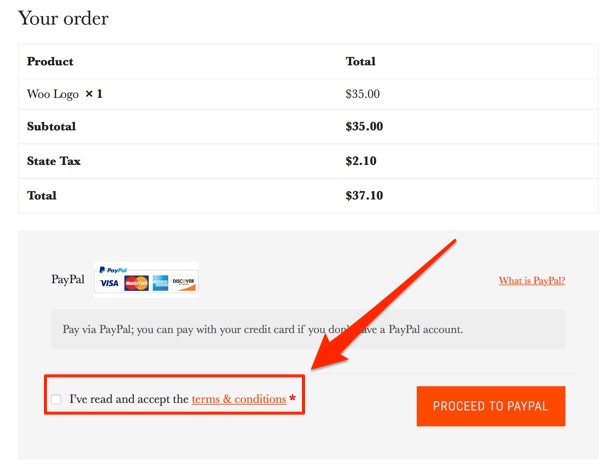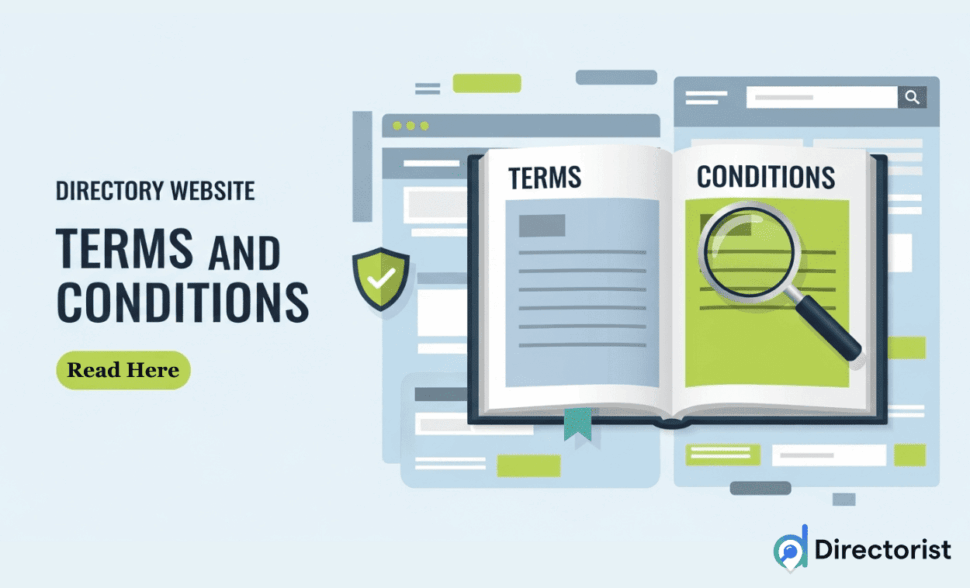Table of Contents
- 1 Why Does Your Directory Website Need Terms and Conditions?
- 2 What to Include in Your Directory Website Terms and Conditions Page?
- 3 Why You Should not Copy Another Website’s Terms and Conditions?
- 4 How to Get Sample Terms and Conditions for Your Directory Website?
- 5 How to Implement Terms and Conditions on Your Directory Website
- 6 Conclusion
Terms and Conditions for a Directory Website (With Samples)
Have you ever seen the anchor text or hyperlinked text, “Terms and Conditions” twinkling on the bottom of the footer of a website? If you click on the text, it will take you to the webpage of the terms and conditions or Terms of Use, or Terms of Service. They may also simply be called legal pages.
Terms and conditions is a legal binding contract between you and your website users. These are a set of rules for the users and listing owners that they must abide by while using your website. Done correctly, you can avoid any legal issues that may arise when somebody misuses your website.
While legal pages such as Terms and Conditions (T&C), Terms of Service (TOS) or simply Terms are very important for your directory website, they are also essential to safeguard your platform in case of activities like transactions, bookings or collecting personal information.
In today’s article, we will be looking at some terms and conditions for a directory website that might be suitable for your website. If you do own a business directory website, you can review this article to determine whether you need to cover any further or to amend your existing ones.
Please note that these terms and conditions are not legal advice. For specific and tailored legal pages, please contact your local jurisdiction or lawyers to avoid any unexpected event.
Table of Contents:
- Why does your directory website need terms and conditions?
- What should be included in your directory website terms and conditions?
- Why you should not copy another website’s terms and conditions
- How to get sample terms and conditions for your directory website?
- How to Implement Terms and Conditions on Your Directory Website
Why Does Your Directory Website Need Terms and Conditions?
Business directory website Terms and Conditions are extremely necessary especially when you have dynamic functionalities such as login, registration, transaction, service request or simply data collection. Among many reasons to incorporate legal pages on your directory, we found the following reasons to be the most prominent in our research:
1. It incorporates the governing laws & regulations

Your website Terms and Conditions page protects your business and its operation from any legal actions. By implementing the legal pages, you can declare to the internet world that you are respectful of regional and international laws and you customers/visitors must agree to the terms to avail your service.
Therefore, while including clauses on your website Terms and Conditions page, you should mention which country or region, or state’s law, the agreement falls under. This provides clarity to visitors from various regions who are unaware of regional governing laws.
If you are operating your directory from San Fransisco, you can state in your legal pages, “These terms and conditions are governed by the laws of the United States of America and the laws of the state of California.”
Similarly, if you operate a city-based business directory in Texas, then your governing law clause could state:
These terms and conditions are governed by the laws of the United States of America and the laws of the State of Texas.
In most cases, the governing law and dispute resolution clauses should reflect the state where your LLC is registered. For instance, if you have formed an LLC in New York, your terms could specify that disputes will be governed by New York state law, ensuring your agreements remain consistent with your business’s legal foundation.
It is not necessary to incorporate the local laws and regulations inside the documentation for your specific niche. Then again, if you reside in a particular area and keep the governing laws on the agreement page then it will be a plus for you.
You can also mention how the disputes will be settled in your legal pages. For example, you can state in your stipulation that any dispute for the use of the website will be dealt with by arbitration procedure.
2. It constitutes the handling of the abuses or misconduct

You must document what constitutes the abuses or any other misconduct from a user of your directory website. To this end, you can incorporate all the possible solutions by stating the probable solutions in your website Terms and Conditions page.
In the cases of spamming other users, unauthorized methods of advertising, providing false information to other users, or using abusive words to any user, you can temporarily or permanently block a user, take any action depending upon the degree of the misconduct, or rectify the user all by yourself.
3. It limits your liability to the users

Technically, if you neglect to add terms and conditions on your website and business owners are selling services or goods via your directory website, then your liability is unlimited.
For example, it is quite likely that your vendors will supply damaged goods or goods with an expired date. Now, if you do not prevent your liability by specifying the agreement with proper terms and conditions, you are doomed!
Another example is when you allow your users to post user-generated content, you have to avoid liability by specifying the conditions for such an incident. Because who knows some of the posted content may be violating Google’s rules by plagiarizing or infringing the copyright of a photo.
4. It sets expectations on directory listings

You must make your directory listings type clear on your terms and conditions. This way the business owners will get to know which listing covers what services. Simply put, how much is the pricing for each advertisement they are posting?
Your terms and conditions should define to listing owners or advertisers what they’re getting from advertising in your directory. For instance. you can mention that the business owners will not enjoy any advanced benefits like featured listings or things like that for any free listing service.
What to Include in Your Directory Website Terms and Conditions Page?
Now that you know how much vital role terms and conditions play for your directory website, let’s know which standard sections you should include in your terms and conditions page:
- The Introduction
- Your governing law
- Your website’s or business’ intellectual property protection
- Rules of using the website (for users and listing owners/advertisers)
- Rules regarding User Generated Content and your use of them
- Your warranty disclaimer and limitation of liability
- Free vs. Paid listings
- Payment terms, and guarantees for paid listings and services
- Your copyright infringement information regarding DMCA Notices
- Contact information for legal assistance
- Last amended or effective date
Why You Should not Copy Another Website’s Terms and Conditions?

Now, you may think that copying other websites’ terms and conditions is just enough to serve your purpose. Unfortunately, it is not going to happen that way! If you just simply copy and paste your directory business name replacing their’s verbatim, it will be a violation of the copyright of the website you are following.
In this circumstance, you will be asked to remove the content or will be notified to compensate for the damages arising from the infringement. They may also contact your web host to remove content from your website showing adequate evidence.
Besides, if you copy and paste another website’s terms and conditions replacing your business name then it may not resonate with your brand. Thus, doing so can be potentially dangerous for your directory website.
How to Get Sample Terms and Conditions for Your Directory Website?

Though you should not copy other websites’ terms and conditions, it is still pretty helpful to have a look at other websites’ terms and conditions. Because it will give you a rough idea of how you should write your terms and conditions for your directory website.
For example, if you are operating a classified ads directory, you can simply go and see how Craiglist is managing terms of use. Again, if you are running a free directory listing website, you can take help from such a website’s terms of use.
Another important way to get legal pages for your website can be just following terms and conditions templates. Then again, you should not copy and paste all verbatim of the template. Rather, you can use it to ease the writing process and do it right. Plus, terms of templates may vary from your actual clause.
Terms and conditions generators
Some terms and conditions generators are specific to directory websites (free and paid business directories). Here are three of them from which you can purchase documents (no affiliate links):
If you are not into investing time to write the DIY terms and conditions page, you have access to paid documents. These terms and conditions templates can be fit for both paid and free business directory websites:
Another major tool to generate terms and conditions is TermsFeed, which will help you not only with directory website-specific terms of service but also with account creation, user contents, payments, data protection, and everything else you need for your directory website.
Again, in all cases, you will have to carefully review and make necessary amendments to them to tailor them to your business needs.
How to Implement Terms and Conditions on Your Directory Website

It’s not just enough to include terms and conditions inside the footer of your website. Among many other methods, the click-wrap method is the best way to implement and showcase your Terms and Conditions. This way you can actively approach to obtain consent from your users by enforcing your policies.
The Click-wrap method is quite effective in limiting your liability by obtaining consent from your users that they have read, acknowledged, understood, and consented to your terms and policies.
For example, you can simply use a check-box containing a link to the disclaimers or terms and conditions page beneath the signup form or registration form to get consent from your users. Here’s an example:

Another great example is when a non-logged-in user visits for the first time on your website, you can implement the ‘Browsewrap’ method. That means you will just use a floating modal having a checkbox or “I agree” button under the terms and conditions links on the screen of any page to get consent from that user.

However, if you want to show legal pages without any hassle, I would like to suggest you use the WordPress legal pages plugin for your directory website. The plugin comes with free templates so you don’t have to write everything from scratch. Apart from showing legal pages, it also shows popups or models and cookie bars to be accepted by the website visitors.
Conclusion
Though implementing terms and conditions are not necessary, they can save all three parties (directory website owner, directory website visitor, and listing owners) from nasty situations in the long run.
Finally, whether you create on your own or collect samples or purchase a sample from a policy generator, it will be wise to review your directory website’s terms and conditions with a lawyer to avoid unexpected errors.
We hope this article will help you create terms and conditions most easily and safely. Do subscribe for regular quality content on our website. You also can find us on our Facebook page, Twitter handle, and Directorist Community.





Leave a Reply
You must be logged in to post a comment.